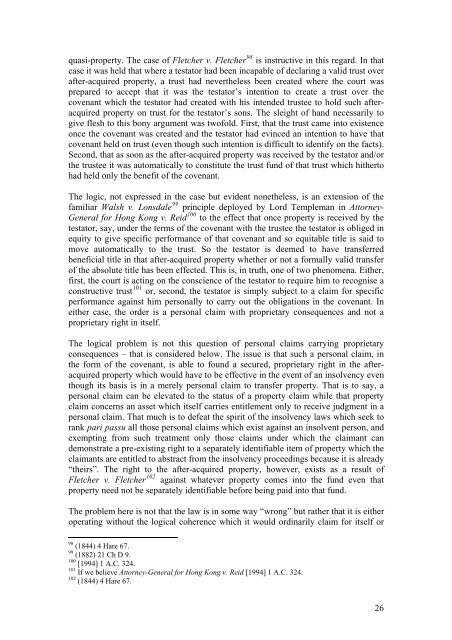The Unbearable Lightness of Property - alastairhudson.com
The Unbearable Lightness of Property - alastairhudson.com
The Unbearable Lightness of Property - alastairhudson.com
You also want an ePaper? Increase the reach of your titles
YUMPU automatically turns print PDFs into web optimized ePapers that Google loves.
quasi-property. <strong>The</strong> case <strong>of</strong> Fletcher v. Fletcher 98 is instructive in this regard. In that<br />
case it was held that where a testator had been incapable <strong>of</strong> declaring a valid trust over<br />
after-acquired property, a trust had nevertheless been created where the court was<br />
prepared to accept that it was the testator’s intention to create a trust over the<br />
covenant which the testator had created with his intended trustee to hold such afteracquired<br />
property on trust for the testator’s sons. <strong>The</strong> sleight <strong>of</strong> hand necessarily to<br />
give flesh to this bony argument was tw<strong>of</strong>old. First, that the trust came into existence<br />
once the covenant was created and the testator had evinced an intention to have that<br />
covenant held on trust (even though such intention is difficult to identify on the facts).<br />
Second, that as soon as the after-acquired property was received by the testator and/or<br />
the trustee it was automatically to constitute the trust fund <strong>of</strong> that trust which hitherto<br />
had held only the benefit <strong>of</strong> the covenant.<br />
<strong>The</strong> logic, not expressed in the case but evident nonetheless, is an extension <strong>of</strong> the<br />
familiar Walsh v. Lonsdale 99 principle deployed by Lord Templeman in Attorney-<br />
General for Hong Kong v. Reid 100 to the effect that once property is received by the<br />
testator, say, under the terms <strong>of</strong> the covenant with the trustee the testator is obliged in<br />
equity to give specific performance <strong>of</strong> that covenant and so equitable title is said to<br />
move automatically to the trust. So the testator is deemed to have transferred<br />
beneficial title in that after-acquired property whether or not a formally valid transfer<br />
<strong>of</strong> the absolute title has been effected. This is, in truth, one <strong>of</strong> two phenomena. Either,<br />
first, the court is acting on the conscience <strong>of</strong> the testator to require him to recognise a<br />
constructive trust 101 or, second, the testator is simply subject to a claim for specific<br />
performance against him personally to carry out the obligations in the covenant. In<br />
either case, the order is a personal claim with proprietary consequences and not a<br />
proprietary right in itself.<br />
<strong>The</strong> logical problem is not this question <strong>of</strong> personal claims carrying proprietary<br />
consequences – that is considered below. <strong>The</strong> issue is that such a personal claim, in<br />
the form <strong>of</strong> the covenant, is able to found a secured, proprietary right in the afteracquired<br />
property which would have to be effective in the event <strong>of</strong> an insolvency even<br />
though its basis is in a merely personal claim to transfer property. That is to say, a<br />
personal claim can be elevated to the status <strong>of</strong> a property claim while that property<br />
claim concerns an asset which itself carries entitlement only to receive judgment in a<br />
personal claim. That much is to defeat the spirit <strong>of</strong> the insolvency laws which seek to<br />
rank pari passu all those personal claims which exist against an insolvent person, and<br />
exempting from such treatment only those claims under which the claimant can<br />
demonstrate a pre-existing right to a separately identifiable item <strong>of</strong> property which the<br />
claimants are entitled to abstract from the insolvency proceedings because it is already<br />
“theirs”. <strong>The</strong> right to the after-acquired property, however, exists as a result <strong>of</strong><br />
Fletcher v. Fletcher 102 against whatever property <strong>com</strong>es into the fund even that<br />
property need not be separately identifiable before being paid into that fund.<br />
<strong>The</strong> problem here is not that the law is in some way “wrong” but rather that it is either<br />
operating without the logical coherence which it would ordinarily claim for itself or<br />
98 (1844) 4 Hare 67.<br />
99 (1882) 21 Ch D 9.<br />
100 [1994] 1 A.C. 324.<br />
101 If we believe Attorney-General for Hong Kong v. Reid [1994] 1 A.C. 324.<br />
102 (1844) 4 Hare 67.<br />
26













